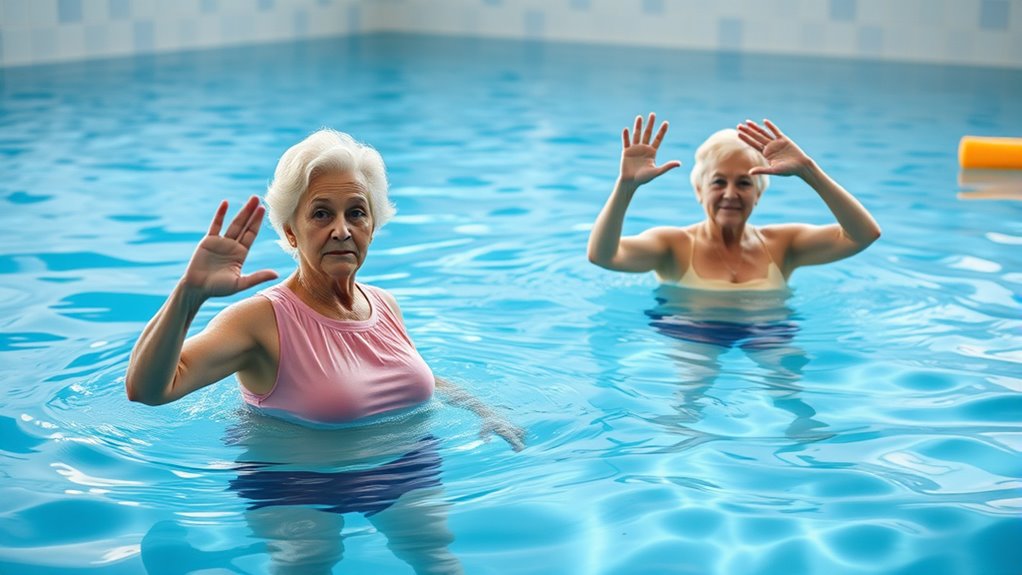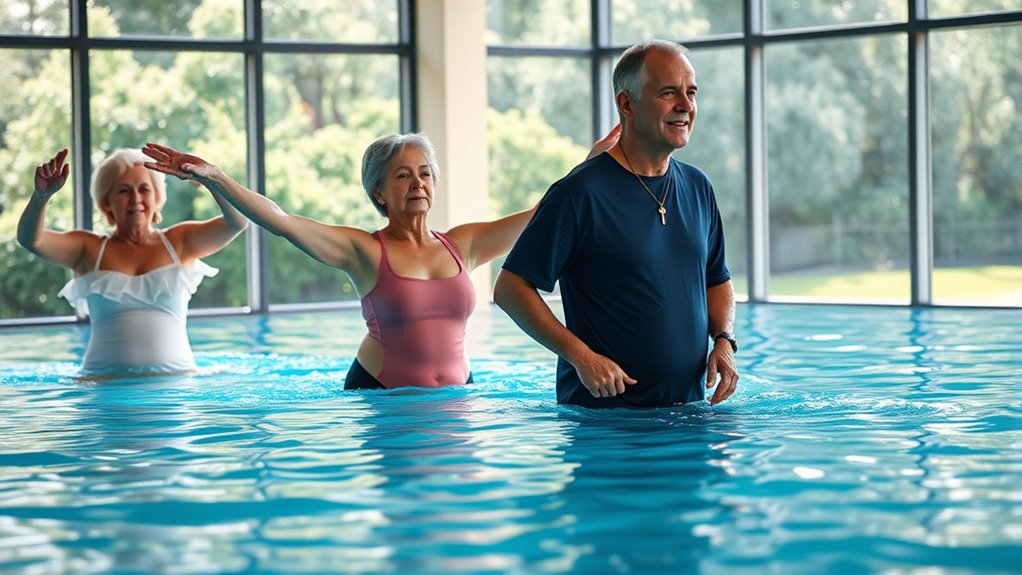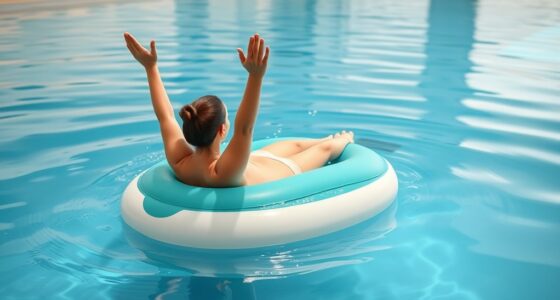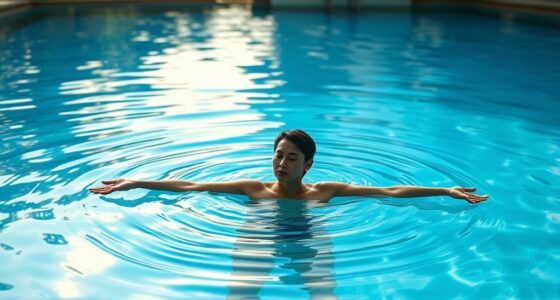Gentle water workouts are a great way for you to stay active without putting stress on your joints. These low-impact exercises, like water walking, arm lifts, and gentle stretches, help improve your strength, flexibility, and cardiovascular health in a safe, relaxing environment. Warm water eases stiffness, and the buoyancy reduces injury risk. If you keep exploring, you’ll discover how to integrate these supportive routines into your fitness plan for better mobility and well-being.
Key Takeaways
- Water workouts provide low-impact, joint-friendly exercises ideal for seniors with mobility or joint pain concerns.
- Aquatic therapy and water aerobics offer gentle, guided movements that improve strength, flexibility, and balance safely.
- Warm water relaxes muscles, reduces stiffness, and enhances flexibility, making exercises more comfortable and effective.
- Activities can be adapted to individual fitness levels, gradually increasing intensity as confidence and strength develop.
- Group classes foster social engagement, motivation, and enjoyment, supporting overall well-being and consistent participation.

Water workouts offer seniors a safe and effective way to stay active, especially for those with joint pain or mobility issues. The buoyancy of water reduces the impact on your joints, making it easier to move without discomfort. Whether you’re looking to improve flexibility, strength, or cardiovascular health, aquatic therapy and water aerobics provide gentle yet effective options. These low-impact exercises help you build endurance while minimizing the risk of injury, making them an ideal choice for seniors seeking a safe workout environment.
Aquatic therapy is a popular method that involves guided exercises in the pool, often supervised by a trained therapist. It targets specific issues such as arthritis, muscle weakness, or balance problems. The warm water relaxes muscles and eases stiffness, allowing you to perform movements that might be painful on land. You can do simple stretches, gentle resistance exercises, and balance drills that promote stability and coordination. Because water supports your body, you can focus on proper form and controlled movements without the fear of falling or overexerting yourself.
Water aerobics is another excellent way to stay active in the pool. It combines rhythmic movements with music, which makes exercising both fun and motivating. You don’t need to be a seasoned athlete to participate—many classes are designed specifically for seniors, emphasizing gentle choreography and low-impact moves. You’ll perform arm lifts, leg kicks, and water walking, all of which strengthen muscles and improve cardiovascular health. The resistance of water makes these exercises more effective than doing them on land, without putting undue stress on your joints.
Both aquatic therapy and water aerobics are adaptable to your fitness level. You can start with slow, controlled motions and gradually increase intensity as your strength and confidence improve. The warm water not only helps loosen stiff joints but also promotes relaxation, reducing stress and tension. Plus, exercising in water can boost your mood and help you feel more energized throughout the day. Incorporating proper use of equipment such as water weights or noodles can further enhance the effectiveness of your workout.
Joining a water workout class can also provide social benefits. It’s a great way to meet others who share your goals and interests, helping you stay motivated and committed. Many community pools and senior centers offer specialized classes that cater to different ability levels, so you can find a program that suits your needs. Remember, the key is consistency—regular water workouts can enhance your mobility, reduce pain, and improve your overall well-being. With gentle guidance and the soothing properties of water, you can enjoy a safe, effective, and enjoyable exercise routine that keeps you active and healthy.
Frequently Asked Questions
How Often Should Seniors Do Water Workouts Weekly?
You should aim for water workouts about three to five times a week to enjoy the hydrotherapy benefits and improve your mobility. Regular exercise in the pool offers low-impact activity that minimizes joint stress while boosting strength and flexibility. Always prioritize pool safety by staying within your comfort zone and listening to your body. Consistency is key, and consulting with a healthcare provider can help tailor the right routine for your needs.
Are Water Exercises Suitable for Seniors With Joint Pain?
When it comes to joint pain, water exercises can be a godsend—think of them as a gentle hand guiding you through recovery. These joint-friendly routines reduce impact on your joints, making movements smoother and less painful. Aquatic therapy is especially beneficial, allowing you to strengthen muscles without aggravating pain. If you’re considering this, always consult your healthcare provider to make certain it’s the right fit for your needs.
What Equipment Is Needed for Gentle Water Workouts?
For gentle water workouts, you’ll need minimal equipment. Pool noodles are great for providing support and adding resistance during exercises. Waterproof shoes help keep your footing secure and prevent slips in the pool. You might also consider water weights or resistance bands designed for aquatic use. These tools make your workout safer and more effective while keeping the movements low-impact and gentle on your joints.
Can Water Workouts Help Improve Balance and Coordination?
Imagine this: as if you’re stepping into the future, water workouts can greatly boost your balance and coordination. Hydrotherapy benefits include gentle resistance and support, making movements easier and safer. Through aquatic therapy, you engage muscles without impact, helping you improve stability and coordination. Regularly practicing these exercises in the pool can lead to better posture, reduced falls, and increased confidence—making you feel more grounded and ready for anything.
Are There Any Safety Tips for Seniors Starting Water Exercises?
When starting water exercises, it’s crucial to prioritize safety. Keep hydrotherapy benefits in mind, such as improved strength and flexibility, but always follow pool safety tips like staying hydrated, wearing appropriate footwear, and not pushing yourself too hard. Listen to your body, take breaks when needed, and consult with your healthcare provider before beginning. These precautions help guarantee you enjoy the benefits safely and comfortably.
Conclusion
Imagine slipping into the pool and feeling your muscles loosen with each gentle movement. Take Mrs. Johnson, a 75-year-old who started water exercises to improve her balance. After just a few weeks, she noticed less joint pain and more energy. Water workouts offer a safe, enjoyable way to stay active and boost your well-being. So, immerse yourself and let the calming water help you stay strong and healthy, one gentle stroke at a time.










